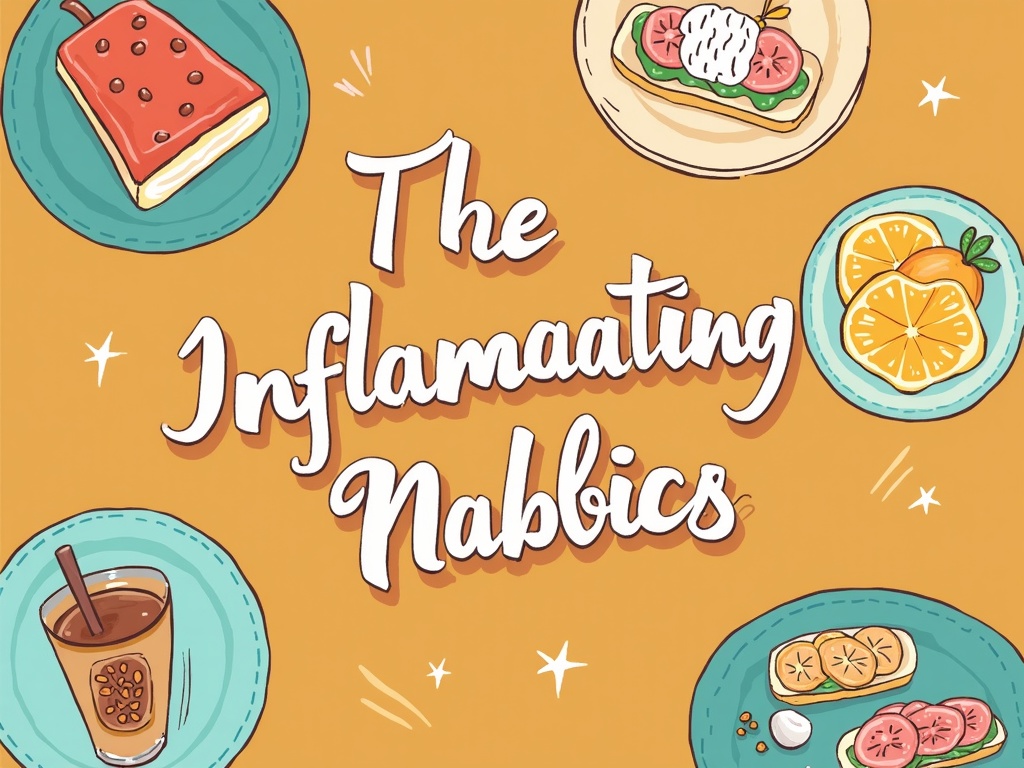Are Your Snacking Habits Secretly Fueling Inflammation?
That afternoon slump hits hard. Your energy is crashing, and your brain feels like it's wading through molasses. What's the solution? For many, it's a quick trip to the snack drawer or vending machine. But what if those convenient snacks are actually doing more harm than good? What if they're contributing to chronic inflammation, a silent saboteur linked to a host of age-related health problems?
It's easy to underestimate the power of snacking. We often view snacks as innocent little pick-me-ups, but the truth is that the cumulative effect of poor snacking habits can have a significant impact on our overall health and well-being, particularly as we age. Understanding which snacking habits promote inflammation – and, more importantly, how to avoid them – is crucial for maintaining a healthy, vibrant life.
The Inflammation Connection: Why Snacking Matters
Inflammation is a natural process. It's the body's way of responding to injury or infection. Acute inflammation is essential for healing. However, chronic inflammation, a low-grade, persistent inflammatory state, is a different beast altogether. It's been implicated in a wide range of age-related diseases, including heart disease, type 2 diabetes, arthritis, Alzheimer's disease, and even some types of cancer. Factors that contribute to chronic inflammation include genetics, environmental toxins, stress, and – you guessed it – diet. And that's where snacking habits come into play.
Certain foods are known to be pro-inflammatory, meaning they promote inflammation in the body. When we consistently choose these foods as snacks, we're essentially fueling the fire of chronic inflammation. Conversely, other foods are anti-inflammatory, helping to quell that fire and protect our health.
Snacking Sins: Inflammatory Habits to Avoid
Let's take a closer look at some common snacking habits that can contribute to inflammation:
1. Sugar, Sugar Everywhere
Added sugars are a major culprit when it comes to inflammation. Think sugary cereals, candy bars, pastries, sweetened yogurt, and even seemingly healthy granola bars packed with hidden sugars. These foods cause a rapid spike in blood sugar, which triggers the release of inflammatory markers called cytokines. High-fructose corn syrup is particularly problematic, as it's metabolized differently than other sugars and can lead to increased inflammation and insulin resistance.
2. The Refined Carb Trap
Refined carbohydrates, like those found in white bread, white rice, and many processed snacks (crackers, chips, pretzels), are quickly broken down into glucose in the body. This rapid conversion leads to a similar blood sugar spike and subsequent inflammatory response as consuming sugary foods. Furthermore, these foods often lack essential nutrients like fiber, which helps regulate blood sugar levels and promote gut health.
3. Trans Fats: A Recipe for Disaster
Trans fats, often found in processed snacks, fried foods, and some commercially baked goods, are notorious for their inflammatory effects. They not only raise levels of LDL (bad) cholesterol but also promote inflammation by activating inflammatory pathways in the body. While trans fats have been largely phased out of many food products, it's still important to check ingredient labels carefully, especially when buying packaged snacks.
4. Processed Meats: Handle with Caution
Processed meats, such as sausages, bacon, hot dogs, and deli meats, often contain high levels of saturated fat, sodium, and preservatives. These factors can contribute to inflammation. High saturated fat intake can promote inflammation by triggering the release of inflammatory molecules. Additionally, some preservatives used in processed meats, like nitrates and nitrites, have been linked to increased inflammation and other health risks.
5. Vegetable Oils: Not Always a Healthy Choice
While some vegetable oils, like olive oil, are known for their anti-inflammatory properties, others, such as soybean oil, corn oil, and sunflower oil, are high in omega-6 fatty acids. While omega-6 fatty acids are essential, consuming excessive amounts relative to omega-3 fatty acids (found in fatty fish, flaxseeds, and walnuts) can promote inflammation. This imbalance is common in Western diets, where processed foods often contain high levels of omega-6-rich oils.
Snacking for Sanity: Anti-Inflammatory Alternatives
The good news is that there are plenty of delicious and satisfying snacks that can actually help reduce inflammation. Making smart snack choices can be a powerful way to support your overall health and well-being.
1. Embrace Fruits and Vegetables: Nature's Candy
Fruits and vegetables are packed with vitamins, minerals, antioxidants, and fiber, all of which can help combat inflammation. Berries, in particular, are rich in antioxidants called anthocyanins, which have potent anti-inflammatory effects. Leafy green vegetables, like spinach and kale, are excellent sources of vitamins and minerals that support immune function and reduce inflammation. Some great choices include:
- Berries (blueberries, strawberries, raspberries, blackberries)
- Cherries
- Avocado
- Leafy greens (spinach, kale, collard greens)
- Broccoli
- Bell peppers
2. Nuts and Seeds: Powerhouse Snacks
Nuts and seeds are excellent sources of healthy fats, protein, and fiber, all of which contribute to satiety and help regulate blood sugar levels. Walnuts, flaxseeds, and chia seeds are particularly rich in omega-3 fatty acids, which have potent anti-inflammatory properties. However, it's important to choose unsalted varieties to avoid excess sodium intake.
3. Healthy Fats: Fuel Your Body and Brain
Healthy fats, like those found in avocados, olive oil, and fatty fish, can help reduce inflammation. Olive oil contains oleocanthal, a compound with anti-inflammatory properties similar to ibuprofen. Avocados are rich in monounsaturated fats and antioxidants that support heart health and reduce inflammation.
4. Whole Grains: The Fiber Factor
Whole grains, like oats, quinoa, and brown rice, are rich in fiber, which helps regulate blood sugar levels and promote gut health. A healthy gut microbiome is essential for preventing inflammation. Choose whole-grain crackers, bread, or homemade granola bars instead of their refined-grain counterparts.
5. Yogurt (with a caveat): Choose Wisely
Yogurt can be a healthy snack, but it's important to choose wisely. Opt for plain, unsweetened yogurt and add your own toppings, like berries, nuts, and seeds. Avoid flavored yogurts, which are often loaded with added sugars. Probiotic-rich yogurt can also support gut health and reduce inflammation.
Simple Swaps for a Healthier You
Here are a few simple swaps you can make to replace inflammatory snacks with anti-inflammatory alternatives:
- Instead of candy bars, try a handful of berries with a few dark chocolate squares.
- Instead of potato chips, try air-popped popcorn with a sprinkle of nutritional yeast.
- Instead of sweetened yogurt, try plain yogurt with berries and a drizzle of honey.
- Instead of processed meat snacks, try hard-boiled eggs or a handful of almonds.
- Instead of sugary granola bars, try homemade granola bars with oats, nuts, seeds, and dried fruit.
Beyond the Bites: Lifestyle Factors That Fight Inflammation
While choosing anti-inflammatory snacks is a crucial step, it's important to remember that snacking is just one piece of the puzzle. Other lifestyle factors that can significantly impact inflammation include:
- Regular Exercise: Physical activity helps reduce inflammation by promoting the release of anti-inflammatory molecules and improving insulin sensitivity.
- Stress Management: Chronic stress can contribute to inflammation. Practicing stress-reduction techniques, like yoga, meditation, or deep breathing exercises, can help lower inflammation levels.
- Adequate Sleep: Sleep deprivation can disrupt hormone balance and increase inflammation. Aim for 7-8 hours of quality sleep each night.
- Hydration: Drinking plenty of water helps flush out toxins and keep your body functioning optimally, which can help reduce inflammation.
Listen to Your Body: The Ultimate Guide
Ultimately, the best way to determine which snacks are right for you is to pay attention to how your body responds. Keep a food journal and track how you feel after eating different snacks. Do you experience bloating, fatigue, or other symptoms of inflammation? If so, try eliminating those snacks from your diet and see if you notice a difference. Remember, everyone is different, and what works for one person may not work for another.
Snack Smarter, Age Healthier
Snacking doesn't have to be a guilty pleasure. By making mindful choices and opting for anti-inflammatory snacks, you can nourish your body, reduce inflammation, and support a healthier, more vibrant life, especially as you age. So, ditch the processed junk and embrace the power of whole, nutrient-rich foods. Your body will thank you for it.


